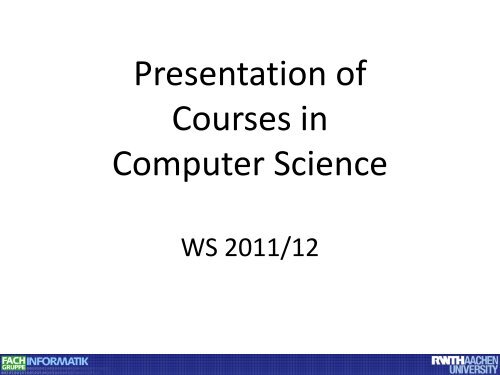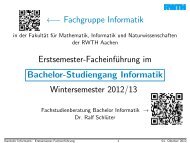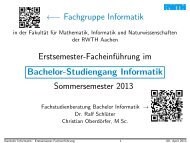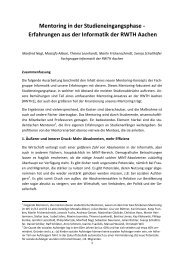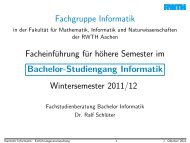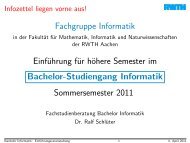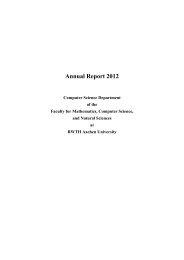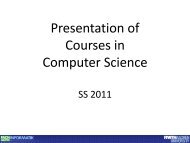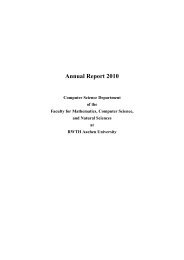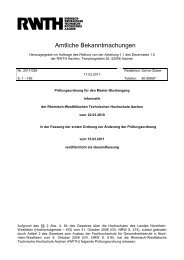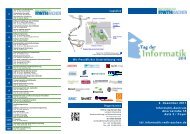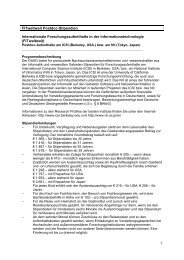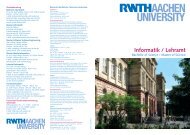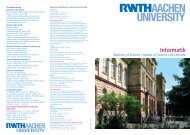V3 Ã2, 6 ECTS - Fachgruppe Informatik an der RWTH Aachen
V3 Ã2, 6 ECTS - Fachgruppe Informatik an der RWTH Aachen
V3 Ã2, 6 ECTS - Fachgruppe Informatik an der RWTH Aachen
You also want an ePaper? Increase the reach of your titles
YUMPU automatically turns print PDFs into web optimized ePapers that Google loves.
Presentation of<br />
Courses in<br />
Computer Science<br />
WS 2011/12
Presentation of Courses WS11<br />
• Overview of all elective courses<br />
for Bachelor / Master / Diplom<br />
• Sorted according to 4 areas of Computer Science<br />
1. Theoretische <strong>Informatik</strong> (Theoretical Computer Science)<br />
2. Software & Kommunikation (Software & Communication)<br />
3. Daten- & Informationsmgmt. (Data- & Information-M<strong>an</strong>agement)<br />
4. Angew<strong>an</strong>dte <strong>Informatik</strong> (Applied Computer Science)<br />
• Tr<strong>an</strong>sition slides contain key information about<br />
courses (title, room, time schedule)<br />
• Labels:<br />
B<br />
Bachelor<br />
D Diplom<br />
M Master
Presentation Rules<br />
• Each professor gets 2 minutes<br />
• Slide presentation proceeds automatically<br />
• Acceleration is possible, slowing down is not<br />
• Next professor takes over during tr<strong>an</strong>sition slide<br />
(which are shown for 15 seconds)
Bereich 1:<br />
Theoretische <strong>Informatik</strong>
Bereich 1: Theoretische <strong>Informatik</strong><br />
Theorie Hybri<strong>der</strong> Systeme<br />
Nachwuchsgruppe <strong>Informatik</strong> 2<br />
Prof. Dr. Erika Ábrahám<br />
Erfüllbarkeitsüberprüfung (Satisfiability Checking) (<strong>V3</strong> Ü1, 6 <strong>ECTS</strong>)<br />
V: Mo,15:30-17:00 5056<br />
V+Ü: Do,10:00-11:30 5056<br />
Start: 10.10.2011<br />
B M D
Satisfiability Checking<br />
How to check automatically if a<br />
formula of a given logic is satisfiable?
a ∨ b ∧ a ∨ ¬b<br />
f x = a ∧ x = y ⇒ f y = a<br />
2x + y > 5 ∧ x + 2y < 5<br />
x, y ∈ R<br />
x 2 + y 2 = z 2<br />
x, y, z ∈ R<br />
2i + j = 5 ∧ j < i<br />
i, j ∈ N<br />
i ≤ x 2 + y 2 ∧ a i = a j
We will get known to<br />
algorithms <strong>an</strong>d tools<br />
for satisfiability checking<br />
<strong>an</strong>d motivate their usage<br />
in the context of<br />
program verification.<br />
SWS:<br />
<strong>V3</strong>+Ü1<br />
Times: Monday 15:30-17:00,<br />
Thursday 10:00-11:30 (both in 5056)<br />
Start: Oct 10, 2011<br />
Learning support: Book, lecture notes, slides, video recording<br />
Related: SAT seminar
Bereich 2:<br />
Software und<br />
Kommunikation
Bereich 2: Software und Kommunikation<br />
Kommunikation und Verteilte Systeme<br />
Lehrstuhl <strong>Informatik</strong> 4<br />
Prof. Dr. Klaus Wehrle<br />
Adv<strong>an</strong>ced Internet Technology (<strong>V3</strong> Ü1, 6 <strong>ECTS</strong>)<br />
V: Mo. 14:00 – 15:30 AH I<br />
Do. 10:00 – 11:30 AH III<br />
Ü: Do. 15:45 – 17:15 AH III (14 tgl. )<br />
Start: 10.10.2011<br />
Multimedia Internet Technology (<strong>V3</strong> Ü1, 6 <strong>ECTS</strong>)<br />
V: Mo. 15:45 – 17:15 AH I<br />
Di. 14:00 – 15:30 AH I<br />
Ü: Mi. 12:15 – 13:45 AH III (14 tgl. )<br />
Start: 7.11.2011<br />
Research Focus Class on Communication Systems (<strong>V3</strong> Ü2, 6 <strong>ECTS</strong>)<br />
Start: 14.10.2011<br />
B M D<br />
M D<br />
M D
Lecture: Adv<strong>an</strong>ced Internet Technology (AIT)<br />
Reliability<br />
Peer-to-Peer<br />
Systems<br />
Mobile<br />
Internet<br />
Technology<br />
(SS 2012)<br />
Mobility<br />
Security<br />
Scalability<br />
Perform<strong>an</strong>ce<br />
Sensor<br />
Networks<br />
Lecture: Adv<strong>an</strong>ced Internet Technology<br />
Adaptivity<br />
- starts on October 10 th<br />
Cross-Layer<br />
- m<strong>an</strong>datory for specialization at COMSYS<br />
Coordination<br />
Communication &<br />
Distributed<br />
Systems<br />
11
Lecture: Multimedia Internet Technology (MMT)<br />
Applications<br />
“Classical” Internet<br />
E-mail<br />
File tr<strong>an</strong>sfer<br />
Simple web pages<br />
Streaming applications<br />
Audio/video<br />
characteristics<br />
Today<br />
Quality of Service<br />
Lecture: Multimedia Internet Technology<br />
- starts on November 7 th !<br />
- only for Master<br />
Interactive applications<br />
New protocols<br />
Communication &<br />
Distributed<br />
Systems<br />
12
Research Focus Class on Communication Systems<br />
• Concept <strong>an</strong>d operations<br />
Introduction by COMSYS lecturers/staff – basics<br />
Selection of topics to be discussed in<br />
the team – hot topics<br />
Talks <strong>an</strong>d discussions prepared by<br />
students – highly interactive<br />
Real research: ad-hoc simulations,<br />
prototypes, experiments<br />
Depends on interest of students (>5)<br />
Interested? More information:<br />
• Topics in WS 2011/2012<br />
- Introductory meeting<br />
Perform<strong>an</strong>ce - Friday <strong>an</strong>d Reliability October of 14Communication th 13:00 – 14:00h Systems<br />
- COMSYS seminar room<br />
User-centric mobile Services<br />
- only for Master<br />
Communication &<br />
Distributed<br />
Systems<br />
13
Bereich 2: Software und Kommunikation<br />
Software für eingebettete Systeme<br />
Lehrstuhl <strong>Informatik</strong> 11<br />
Prof. Dr. Stef<strong>an</strong> Kowalewski<br />
Dynamische Systeme für <strong>Informatik</strong>er (<strong>V3</strong> Ü1, 6 <strong>ECTS</strong>)<br />
V: Di. 10:00-11:30 AH III<br />
V+Ü: Fr. 11:45-13:15 AH III<br />
Start: 11.10.2011<br />
M D
i11 – Embedded Software<br />
Prof. Dr.-Ing. Stef<strong>an</strong> Kowalewski<br />
15
Course Schedule<br />
Winter 2012/13<br />
Dynamische Systeme<br />
für <strong>Informatik</strong>er<br />
Formal methods for<br />
embedded systems<br />
Sommer 2012<br />
(Introduction to)<br />
Embedded systems<br />
Safety & Reliability<br />
Winter 2011/12<br />
Dynamische Systeme<br />
für <strong>Informatik</strong>er<br />
Sommer 2011<br />
(Introduction to)<br />
Embedded systems<br />
Safety & Reliability<br />
16
Dynamische Systeme für <strong>Informatik</strong>er<br />
• auf Deutsch<br />
• <strong>V3</strong>/Ü1, 6 <strong>ECTS</strong><br />
• Termine:<br />
- Dienstag, 10:00 – 11:30, AH III (2350|314.1)<br />
- Freitag, 11:45 – 13:15, AH III (2350|314.1)<br />
• Erste Vorlesung: Dienstag, 11.10.2011<br />
• Inhalt:<br />
- Grundlagen: Kontinuierliche Systemtheorie<br />
- Lineare Systeme, Linearisierung<br />
- Modellierung kontinuierlicher Systeme<br />
- Analyse linearer Systeme<br />
- Simulation (Matlab/Simulink)<br />
- Reglerentwurf<br />
17
Student Competitions<br />
Carolo Cup 2012<br />
IMAV<br />
• Autonomous model car (1:10)<br />
• Software <strong>an</strong>d hardware development<br />
• Autonomous driving / parking<br />
• Driving around obstacles<br />
• Team Website: www.galaxis.rwthaachen.de<br />
• Contact: Hilal Diab<br />
(diab@embedded.rwth-aachen.de)<br />
• Requirement: build a complete MAV<br />
on your own<br />
• Goal: MAV has to pass different<br />
missions autonomously<br />
• Details on the competition:<br />
www.imav2011.org<br />
• <strong>RWTH</strong> participates with team<br />
MAVerix<br />
• Contact: Dominik Fr<strong>an</strong>ke<br />
(fr<strong>an</strong>ke@embedded.rwth-aachen.de)<br />
18
Bereich 3:<br />
Daten- und<br />
Informationsm<strong>an</strong>agement
Bereich 3: Daten- und Informationsm<strong>an</strong>agement<br />
Informationssysteme und Datenb<strong>an</strong>ken<br />
Lehrstuhl <strong>Informatik</strong> 5<br />
Prof. Dr. Matthias Jarke<br />
Implementation of Databases (<strong>V3</strong> Ü1, 6 <strong>ECTS</strong>)<br />
V: Di. 15:45 – 17:15 5053<br />
Do. 15:00 – 16:30 5053<br />
Ü: Do. 15:00 – 16:30 5053<br />
Start: 11.10.2011<br />
Web Science (V2 Ü1, 4 <strong>ECTS</strong>)<br />
V: Mo. 10:00 – 11:30 5053<br />
Fr. 10:00 – 11:30 (bi-weekly) 5053<br />
Ü: Fr. 10:00 – 11:30 (bi-weekly) 5053<br />
Start: 10.10.2011<br />
Media, Culture, <strong>an</strong>d Mind (V2 Ü1, 4 <strong>ECTS</strong>)<br />
V: Mo. 14:45-17:00 B-IT Building Bonn<br />
Start: 24.10.2011<br />
B M D<br />
M D<br />
M D
Implementation of Databases<br />
(<strong>V3</strong>/Ü1, Jarke/Quix)<br />
Bachelor/Master/Diplom<br />
Lecture: Tuesdays, 15.45-17.15 (start: Oct. 11)<br />
Thursdays, 15.00-16.30 (bi-weekly, start: Oct. 20)<br />
Exercises: Thursdays, 15.00-16.30 (bi-weekly, start: Oct. 27)<br />
Room 5053.2 (seminar room B-IT RS, opposite to AH 6)<br />
• Database Architectures<br />
• Query Evaluation <strong>an</strong>d Optimization<br />
• Integrity Checking<br />
• Queries in Integrated Information Systems<br />
• Adv<strong>an</strong>ced Tr<strong>an</strong>saction M<strong>an</strong>agement<br />
• Information M<strong>an</strong>agement in the Internet
Web Science<br />
(<strong>V3</strong>/Ü1, Klamma/Jarke)<br />
Master/Diplom<br />
Lecture: Mondays, 10.00-11.30 (start: Oct. 10)<br />
Fridays, 10.00-11.30<br />
(bi-weekly)<br />
Exercises: Fridays, 10.00-11.30 (bi-weekly, start: Oct. 14)<br />
Room 5053.2 (seminar room B-IT RS, opposite to AH 6)<br />
• How to <strong>an</strong>alyze <strong>an</strong>d un<strong>der</strong>st<strong>an</strong>d complex networks?<br />
• What is the PageR<strong>an</strong>k algorithm?<br />
• What are recommen<strong>der</strong> systems <strong>an</strong>d their algorithms?<br />
• What is (mobile) cloud computing <strong>an</strong>d Map-Reduce?<br />
• What is XMPP <strong>an</strong>d the real-time web?<br />
• Large & real graph data structures & algorithms<br />
• Web engineering techniques (Google App, Sem<strong>an</strong>tic Web,<br />
<strong>an</strong>d XMPP, etc.)
Media, Culture, <strong>an</strong>d Mind<br />
(V2/Ü1, Evola/Jarke)<br />
Master/Diplom<br />
Lecture/Exercise: Mondays, 14.45-17.00 (start: Oct. 24)<br />
B-IT Building, Bonn<br />
• How do hum<strong>an</strong>s un<strong>der</strong>st<strong>an</strong>d the world around them,<br />
<strong>an</strong>d how do we talk about it?<br />
• How is me<strong>an</strong>ing construed from a productive <strong>an</strong>d interpretive<br />
level in verbal <strong>an</strong>d non-verbal symbolic systems of<br />
representation?<br />
• What role does culture have in both linguistic <strong>an</strong>d<br />
non-linguistic communication?<br />
• How are creativity <strong>an</strong>d me<strong>an</strong>ing accounted for in<br />
multimodality <strong>an</strong>d multimediality?<br />
• How is all of this applicable to the society of the Digital Age?
Bereich 3: Daten- und Informationsm<strong>an</strong>agement<br />
Datenm<strong>an</strong>agement und -exploration<br />
Lehrstuhl <strong>Informatik</strong> 9<br />
Prof. Dr. Thomas Seidl<br />
Data Mining Algorithms (<strong>V3</strong> Ü2, 6 <strong>ECTS</strong>)<br />
V: Di. 13:15 – 15:45 AH VI<br />
Ü: Mi. 13:30 – 15:00 AH I<br />
Start: 11.10.2011<br />
M D<br />
Exploring Temporal <strong>an</strong>d Graph Data: Mining & Retrieval (<strong>V3</strong> Ü2, 6 <strong>ECTS</strong>)<br />
V: Do,14:15-16:30 AH VI<br />
Ü: Fr,09:00-11:30 AH I<br />
Start: 13.10.2011<br />
M D
WS 2011/2012<br />
Topics <strong>an</strong>d lectures offered by i9<br />
Learn more on dme.rwth-aachen.de/teaching<br />
• Data Mining Algorithms<br />
• How to turn 'just data' into knowledge?<br />
• Algorithms for clustering, market basket <strong>an</strong>alysis, ...<br />
• Exploring Temporal <strong>an</strong>d Graph Data: Mining & Retrieval<br />
• How to identify groups in social networks?<br />
• How to find patterns in evolving data streams?<br />
• How to <strong>an</strong>alyze stock market data?<br />
• Exploring High-dimensional Data: Adv<strong>an</strong>ced Mining Techniques<br />
• How to find patterns in very high dimensional gene expression data?<br />
• How to detect credit card fraud?<br />
• Exploring Multimedia Data: Content-Based Search & Retrieval<br />
• How to define similarity between images?<br />
• How to speed up multimedia retrieval <strong>an</strong>d exploration?
Bereich 4:<br />
Angew<strong>an</strong>dte <strong>Informatik</strong>
Bereich 4: Angew<strong>an</strong>dte <strong>Informatik</strong><br />
Medieninformatik und Mensch-Computer-Interaction<br />
Lehrstuhl <strong>Informatik</strong> 10<br />
Prof. Dr. J<strong>an</strong> Borchers<br />
Designing Interactive Systems I (<strong>V3</strong> Ü2, 6 <strong>ECTS</strong>)<br />
V/Ü: Mo. 13:15-14:45 5053.2<br />
V/Ü: Mi. 09:30-12:00 5053.2<br />
Start: 10.10.2011<br />
B M D<br />
iPhone Anwendungsprogrammierung (<strong>V3</strong> Ü2, 6 <strong>ECTS</strong>)<br />
V: Mo. 15:00-16:30 2010<br />
Ü: Di. 09:00-11:30 4U15<br />
Start: 10.10.2011<br />
B M D
Bereich 4: Angew<strong>an</strong>dte <strong>Informatik</strong><br />
Software <strong>an</strong>d Tools for Computational Engineering<br />
LuFG <strong>Informatik</strong> 12<br />
Prof. Dr. Uwe Naum<strong>an</strong>n<br />
Computational Differentiation (<strong>V3</strong> Ü1, 6 <strong>ECTS</strong>)<br />
V: Di. 10:00 – 11:30 5052<br />
Do. 10:00 – 11:30 5052<br />
Ü: Do. 10:00 – 11:30 5052<br />
Start: 11.10.2011<br />
D M
LuFG <strong>Informatik</strong> 12 :<br />
Software <strong>an</strong>d Tools for Computational Engineering<br />
Prof. Dr. Uwe Naum<strong>an</strong>n<br />
www.stce.rwth-aachen.de<br />
Research<br />
Development <strong>an</strong>d<br />
Teaching<br />
• Compilers for Computational<br />
Science <strong>an</strong>d Engineering (CSE)<br />
• (Parallel) Numerical <strong>an</strong>d<br />
Combinatorial Algorithms for CSE<br />
• Simulation Software Engineering
Computational Differentiation<br />
(<strong>V3</strong>+Ü1, 6 Credits)<br />
Lecture :<br />
• Tue/Thu<br />
10:00-11:30 in 5052<br />
Tutorial :<br />
• Thu<br />
10:00-11:30 in 5052<br />
Start : 11.10
Bereich 1:<br />
Theoretische <strong>Informatik</strong>
Bereich 1: Theoretische <strong>Informatik</strong><br />
Algorithmen und Komplexität<br />
Lehrstuhl <strong>Informatik</strong> 1<br />
Prof. Dr. Berthold Vöcking, Priv.-Doz. Dr. Walter Unger<br />
Algorithmische Graphentheorie (<strong>V3</strong> Ü2, 6 <strong>ECTS</strong>)<br />
V: Mi. 15:00-16:30 AH V<br />
Do. 08:15-09:45 4017 (Alternative A)<br />
Do. 11:30-13:00 AH III (Alternative B)<br />
Ü: Mo. 14:00-15:30 4017<br />
Di. 16:30-18:00 4017<br />
Start: 12.10.2011<br />
M D
Algorithmische Graphentheorie<br />
Sprache: Deutsch Start: Mi. 12.10. Credits: 6 (8)<br />
●<br />
Spezielle Probleme:<br />
●<br />
Spezielle Graphen:<br />
●<br />
Stabile Mengen<br />
●<br />
Pl<strong>an</strong>are Graphen<br />
●<br />
Separatoren<br />
●<br />
Schnittgraphen<br />
●<br />
Baumweite<br />
●<br />
K<strong>an</strong>tengraphen<br />
●<br />
Färbungen<br />
●<br />
Perfekte Graphen<br />
●<br />
B<strong>an</strong>dweite<br />
●<br />
Chordale Graphen<br />
●<br />
Broadcasting<br />
●<br />
Bipartite Graphen<br />
●<br />
Gossip<br />
●<br />
K-Bäume<br />
●<br />
…...<br />
●<br />
…...
Bereich 1: Theoretische <strong>Informatik</strong><br />
Algorithmische Spieltheorie<br />
LuFG <strong>Informatik</strong> 1<br />
Prof. Dr. Martin Hoefer<br />
Methoden <strong>der</strong> Netzwerk<strong>an</strong>alyse (<strong>V3</strong> Ü1, 6 <strong>ECTS</strong>)<br />
V: Mi. 10:00-11:30 4017<br />
Fr. 10:00-11:30 4017<br />
Start: 12.10.2011<br />
M D
Bereich 1: Theoretische <strong>Informatik</strong><br />
Theoretische <strong>Informatik</strong><br />
LuFG <strong>Informatik</strong> 1<br />
Prof. Dr. Peter Rossm<strong>an</strong>ith<br />
Parameterized Algorithms (V4, 8 <strong>ECTS</strong>)<br />
V: Mo. 08:15-09:45 5054<br />
Mi. 10:00-11:30 5054<br />
Start: 10.10.2011<br />
M D
Bereich 1: Theoretische <strong>Informatik</strong><br />
Softwaremodellierung und Verifikation<br />
Lehrstuhl <strong>Informatik</strong> 2<br />
Prof. Dr. Ir. Joost-Pieter Katoen, Priv.-Doz. Dr. Thomal Noll<br />
Introduction to Model Checking (<strong>V3</strong> Ü2, 6 <strong>ECTS</strong>)<br />
V: Mo. 13:15 – 14:45 5052<br />
Di. 14:00 – 15:30 AH II<br />
Ü: Mi. 15:45 – 17:15 AH V<br />
Start: 10.10.2011<br />
Sem<strong>an</strong>tik und Verifikation von Software (<strong>V3</strong> Ü2, 6 <strong>ECTS</strong>)<br />
V: Mi. 10:00-11:30 AH II<br />
Do. 13:30-15:00 AH I<br />
Ü: Di. 08:15-09:45 AH IV<br />
Di. 11:45-13:10 AH VI<br />
Start: 12.10.2011<br />
B<br />
M D<br />
M D
Bereich 1: Theoretische <strong>Informatik</strong><br />
Programmiersprachen und Verifikation<br />
LuFG <strong>Informatik</strong> 2<br />
Prof. Dr. Jürgen Giesl<br />
Wahlpflicht-Ver<strong>an</strong>staltung wie<strong>der</strong> im SS12
Bereich 1: Theoretische <strong>Informatik</strong><br />
Logik und Theorie diskreter Systeme<br />
Lehrstuhl <strong>Informatik</strong> 7<br />
Prof. Dr. Dr.h.c. Wolfg<strong>an</strong>g Thomas, Prof. Dr. Walter Oberschelp, Emeritus,<br />
Priv.-Doz. Dr. Christof Löding<br />
Infinite Computations (<strong>V3</strong> Ü2, 6 <strong>ECTS</strong>)<br />
Ideengeschichte <strong>der</strong> <strong>Informatik</strong> (V2)<br />
Tree Automata (VT 2, 4 <strong>ECTS</strong> )<br />
Regular <strong>an</strong>d Context-Free L<strong>an</strong>guages:<br />
Adv<strong>an</strong>ced Results (VT2, 4 <strong>ECTS</strong>)<br />
Algorithmisches Lernen (V2 Ü1, 4 <strong>ECTS</strong>)<br />
B M D<br />
B M D<br />
M D<br />
M D<br />
M D
Lehrstuhl <strong>Informatik</strong> 7<br />
Logik und Theorie diskreter Systeme<br />
Prof. Dr. Wolfg<strong>an</strong>g Thomas<br />
Research<br />
areas:<br />
General<br />
Information<br />
Automata theory<br />
Automatic program verification <strong>an</strong>d synthesis<br />
Infinite games <strong>an</strong>d reactive systems<br />
Logic in computer science<br />
Office hour:<br />
Mon 11:15 – 12:15 h<br />
URL: http://www.automata.rwth-aachen.de
Lehrstuhl <strong>Informatik</strong> 7<br />
Logik und Theorie diskreter Systeme<br />
Prof. Dr. Wolfg<strong>an</strong>g Thomas<br />
Infinite Computations (W. Thomas)<br />
<strong>V3</strong> + Ü2<br />
Start: Wednesday, 19.10.2011 at 08:15 h<br />
for Bachelor, Master, Diploma<br />
Content: Automata over infinite words<br />
• Beautiful theory<br />
• Applications in decision problems from logic<br />
• Powerful basis of program verification
Lehrstuhl <strong>Informatik</strong> 7<br />
Logik und Theorie diskreter Systeme<br />
Prof. Dr. Wolfg<strong>an</strong>g Thomas<br />
Ideengeschichte <strong>der</strong> <strong>Informatik</strong> (W. Thomas, W. Oberschelp)<br />
V2<br />
Start: Tuesday, 18.10.2011, AH II 16:00 h<br />
for everybody<br />
Content:<br />
12 lectures on the emergence of informatics over more th<strong>an</strong> 1000 years<br />
Some names:<br />
Al-Khwarizmi, Fibonacci, Adam Riese, Schickard, Leibniz, Boole, Gödel,<br />
Turing.
Lehrstuhl <strong>Informatik</strong> 7<br />
Logik und Theorie diskreter Systeme<br />
Prof. Dr. Wolfg<strong>an</strong>g Thomas<br />
Courses for Master <strong>an</strong>d Diploma<br />
‣ Tree Automata (C. Löding)<br />
Start: Tue, 11.10.2011, Sem. Room<br />
5056<br />
‣ Regular <strong>an</strong>d Context-Free L<strong>an</strong>guages:<br />
Adv<strong>an</strong>ced Results (W. Thomas)<br />
Start: Mon, 10.10.2011, AH II<br />
‣ Algorithmisches Lernen (C. Löding)<br />
Start: Mittwoch, 12.10.2011 Raum 4116 (Seminarraum i7)
Bereich 1: Theoretische <strong>Informatik</strong><br />
Mathematische Grundlagen <strong>der</strong> <strong>Informatik</strong><br />
LuFG <strong>Informatik</strong> 7<br />
Prof. Dr. Erich Grädel<br />
Algorithmic Model Theory (V4 Ü2, 8 <strong>ECTS</strong>)<br />
V: Mo. 10:00 – 11:30 AH II<br />
Do. 10:00 – 11:30 AH V<br />
Ü: Mi. 15:00 – 16:30 AH I<br />
Start: 10.10.2011<br />
M D
Mathematische Grundlagen <strong>der</strong> <strong>Informatik</strong><br />
Prof. Dr. Erich Grädel<br />
Research Topics:<br />
• Mathematical Logic <strong>an</strong>d Foundations of Computer Science<br />
• Algorithmic Model Theory<br />
• Logic <strong>an</strong>d Games<br />
• Logic <strong>an</strong>d Complexity<br />
Lectures:<br />
• Algorithmic Model Theory<br />
• Mathematical Logic I <strong>an</strong>d II<br />
• Logic <strong>an</strong>d Games<br />
• Complexity Theory <strong>an</strong>d Qu<strong>an</strong>tum Computing<br />
More information:<br />
http://logic.rwth-aachen.de/
Mathematische Grundlagen <strong>der</strong> <strong>Informatik</strong><br />
Prof. Dr. Erich Grädel<br />
(Ü2 Algorithmic Model Theory (V4,<br />
Lecture: Start 13.10. 11 Tutorial: Start 19.10.11<br />
Mon 10:00 – 11:30, AH II Wed 15:00 – 16:30, AH I<br />
Thu 10:00 – 11:30, AH V<br />
Content:<br />
• Logical definability <strong>an</strong>d computational complexity<br />
• Decidable <strong>an</strong>d undecidable theories<br />
• Finite model theory<br />
• Infinite structures with finite presentation<br />
• Fixed-point logics<br />
More Information:<br />
http://logic.rwth-aachen.de/Teaching/
Bereich 2:<br />
Software und<br />
Kommunikation
Bereich 2: Software und Kommunikation<br />
Software Engineering<br />
Lehrstuhl <strong>Informatik</strong> 3<br />
Prof. Dr. Bernhard Rumpe, Emeritus Prof. Dr. M<strong>an</strong>fred Nagl<br />
Modellbasierte Softwareentwicklung (V2 Ü3, 6 <strong>ECTS</strong>)<br />
V: Di. 12:10-13:40 AH I<br />
Ü: Do. 13:30-15:00 AH II<br />
Start: 11.10.2011<br />
Angew<strong>an</strong>dte Softwaretechnik im Lebenszyklus<br />
<strong>der</strong> Automobilelektronik (V1, 2 <strong>ECTS</strong>)<br />
V: Mo. 17:00-18:30 5052<br />
Start: 10.10.2011<br />
B M D<br />
M D<br />
Generative Softwareentwicklung in <strong>der</strong> automotiven Praxis (V2, 4 <strong>ECTS</strong>)<br />
V: Mo. 17:00 – 18:30 5052<br />
Start: 18.10.2010<br />
M D<br />
Software Architekturen (<strong>V3</strong> Ü2, 6 <strong>ECTS</strong>)<br />
Blockver<strong>an</strong>staltung, voraussichtlich im März<br />
B<br />
M D
Prof. Dr. B. Rumpe<br />
Lehrstuhl für<br />
Software Engineering<br />
<strong>RWTH</strong> <strong>Aachen</strong><br />
Seite 64<br />
Lehrstuhl<br />
bietet vier Vorlesungen<br />
• Modellbasierte Software Entwicklung (2VL + 3Ü, 6 <strong>ECTS</strong>)<br />
• (Prof. Rumpe)<br />
• Einsatz <strong>der</strong> UML, Methodik <strong>der</strong> Modellierung<br />
• Evolution, Refactoring<br />
a b<br />
c<br />
A<br />
B<br />
C<br />
• Angew<strong>an</strong>dte Softwaretechnik im Lebenszyklus <strong>der</strong><br />
Automobilelektronik (1VL, 2 <strong>ECTS</strong>)<br />
• (Dr. Ansgar Schleicher, Vorst<strong>an</strong>d DSA)<br />
• Mo<strong>der</strong>ne Automobilelektronikarchitektur: Bussysteme,<br />
Steuergeräte, Software und <strong>der</strong>en Entwicklung
Prof. Dr. B. Rumpe<br />
Lehrstuhl für<br />
Software Engineering<br />
<strong>RWTH</strong> <strong>Aachen</strong><br />
Seite 65<br />
Lehrstuhl<br />
bietet vier Vorlesungen<br />
• Generative Softwareentwicklung in <strong>der</strong><br />
automotiven Praxis (2VL, 4 <strong>ECTS</strong>)<br />
• (Dr. Christi<strong>an</strong> Berger, Automotive Safety Technologies GmbH)<br />
• Entwicklungsprozesse von Automobil-OEMs<br />
• Einsatz von AUTOSAR und Verwendung<br />
generativer Techniken<br />
• Software-Architekturen (3VL + 2Ü, 6<strong>ECTS</strong>)<br />
• (Prof. M. Nagl)<br />
• integrieren<strong>der</strong> Ansatz (funktionsorientiert, Schichtung,<br />
Datenabstraktion, OO)<br />
X<br />
Z<br />
Y<br />
W<br />
• Qualitätseigenschaften aus <strong>der</strong> Architektur ablesen<br />
• weitere Informationen und Termine:<br />
http://www.se-rwth.de/
Bereich 2: Software und Kommunikation<br />
WS11/12: Forschungssemester<br />
Software-Konstruktion<br />
LuFG <strong>Informatik</strong> 3<br />
Prof. Dr. Horst Lichter
Bereich 2: Software und Kommunikation<br />
Mobile Network Perform<strong>an</strong>ce<br />
Nachwuchsgruppe <strong>Informatik</strong> 4<br />
Prof. Dr. James Gross<br />
Network Calculus (V2 Ü1, 4 <strong>ECTS</strong>)<br />
V: Mo. 14:00-16:00 UMIC 024<br />
Ü: Fr. 14:00-16:00 UMIC 024<br />
Start: 14.10.2011<br />
M D
Lecture Network Calculus<br />
• Lecturer: Prof. James Gross (UMIC Research Centre)<br />
• Time: Monday 2 – 4 pm, Room 024, UMIC Building<br />
• Content: How to dimension <strong>an</strong> information network to<br />
reach a certain quality level?<br />
Telephone System<br />
Internet<br />
Queuing Theory<br />
MinPlus Algebra<br />
• First lecture: Monday, October 17th 2011 !!<br />
Mobile Network<br />
Perform<strong>an</strong>ce<br />
68
Bereich 3:<br />
Daten- und<br />
Informationsm<strong>an</strong>agement
Bereich 3: Daten- und Informationsm<strong>an</strong>agement<br />
Wissensbasierte Systeme<br />
LuFG <strong>Informatik</strong> 5<br />
Prof. Gerhard Lakemeyer, Ph.D.<br />
Artificial Intelligence (<strong>V3</strong> Ü2, 6 <strong>ECTS</strong>)<br />
V: Mo. 11:45-13:15 AH III<br />
Mi. 08:15-09:45 AH III<br />
Ü: Mi. 11:45-13:15 AH I<br />
Mi. 17:30-19:00<br />
Start: 10.10.2011<br />
AH I<br />
B M D
Knowledge-Based Systems Group<br />
Prof. Gerhard Lakemeyer, Ph.D.<br />
http://kbsg.rwth-aachen.de/<br />
Courses<br />
WS 2011/2012<br />
WS 2011/2012<br />
Knowledge-based Systems Group
Lecture: Artificial Intelligence<br />
• You learn basic principles un<strong>der</strong>lying<br />
intelligent agents (e.g. search, games,<br />
pl<strong>an</strong>ning, uncertainty, learning, robotics)<br />
• Prerequisites: none<br />
• 3hs lecture + 2hs tutorial<br />
• Starts Wednesday, October 12<br />
WS 2011/2012<br />
Knowledge-based Systems Group
Lab Course: Interactive Games a/w Robots<br />
Agent controllers for interactive tasks<br />
• interactive computer games <strong>an</strong>d interactive service robotics<br />
• development poses diverse problems to solve such as<br />
real-time behaviour, communication (A2A/HRI),<br />
pl<strong>an</strong>ning, coordination, execution monitoring, ...<br />
Goals of the Lab<br />
• develop, test, <strong>an</strong>d integrate methods that tackle such problems<br />
• r<strong>an</strong>ge: from API/hardware-level to high-level decision making<br />
Ch<strong>an</strong>ce to<br />
• develop intelligent agents<br />
<strong>an</strong>d/or work with real robots<br />
• apply methods of AI to<br />
interactive games with robots<br />
Requirements<br />
• Basic study period completed (B.Sc./Vordiplom)<br />
• Lecture “Intro to AI” (or equiv.)<br />
• profound programming skills (at least C++)<br />
• high motivation (≥5h/w)<br />
• Linux skills<br />
WS 2011/2012<br />
Knowledge-based Systems Group
Bereich 3: Daten- und Informationsm<strong>an</strong>agement<br />
Computerunterstütztes Lernen<br />
LuFG <strong>Informatik</strong> 9<br />
Prof. Dr. Ulrik Schroe<strong>der</strong><br />
Web Technologien (<strong>V3</strong> Ü2, 6 <strong>ECTS</strong>)<br />
V: Di. 14:00-15:30 5056<br />
Mi. 14:00-16:00<br />
Ü: Do. 08:15-09:45 AH IV<br />
Do. 08:15-09:45 5056<br />
Start: 11.10.2011<br />
B M D
LuFG <strong>Informatik</strong> 9<br />
Engineering innovative learning systems<br />
<br />
<br />
<br />
<br />
<br />
<br />
Learning theories<br />
Web <strong>an</strong>d mobile technologies<br />
Open assessment <strong>an</strong>d intelligent feedback<br />
Educational data mining<br />
Learning <strong>an</strong>alytics<br />
Intelligent recommendation<br />
Didactics of CS<br />
<br />
<br />
<br />
<br />
Teaching CS<br />
Educational technologies<br />
InfoSphere / Schülerlabor <strong>Informatik</strong><br />
Gen<strong>der</strong> <strong>an</strong>d diversity (G&D)<br />
WebTech WS 11/12
Web Engineering<br />
XML Technologies<br />
Content<br />
Test<br />
Web 2.0<br />
SaaS<br />
Mashups<br />
JSON<br />
Web Services<br />
SOAP<br />
REST<br />
Architectures / Frameworks<br />
J2EE SOA<br />
WOA .NET<br />
Schemas<br />
Flash<br />
HTML<br />
Client-side<br />
Technologies<br />
JavaScript<br />
AJAX<br />
CSS<br />
JSP<br />
Ruby<br />
Server-side<br />
Technologies<br />
Servlets<br />
PHP<br />
Perl<br />
RE<br />
IP<br />
TCP<br />
Fundamentals<br />
HTTP<br />
XSLT<br />
XPath<br />
77<br />
WebTech WS 11/12
Concept (Student-centered)<br />
Self-org<strong>an</strong>ized Learning<br />
Peer-Assessment<br />
Project Work<br />
Lectures<br />
Student Presentations<br />
Lecture<br />
Invited Lectures<br />
78<br />
WebTech WS 11/12
WebTech<br />
79<br />
WebTech WS 11/12
Bereich 2: Software und Kommunikation<br />
LuFG IT-Security<br />
Prof. Dr. Ulrike Meyer<br />
IT-Sicherheit 1 - Netzwerksicherheit (<strong>V3</strong> Ü1, 6 <strong>ECTS</strong>)<br />
V/Ü: Mo. 14:00-15:30 UMIC 025<br />
V/Ü: Do. 10:00-11:30 UMIC 025<br />
Start: 10.10.2011<br />
M D
ITSec 1 – Network Security<br />
Related<br />
DNSsec, SSH, SMTP<br />
SSL/TLS<br />
IPsec<br />
Protocols<br />
Encryption Algorithms<br />
Integrity Protection<br />
Digital Signatures<br />
Certificates <strong>an</strong>d PKIs<br />
Authentication <strong>an</strong>d Key Agreement<br />
Basics
Bereich 4:<br />
Angew<strong>an</strong>dte <strong>Informatik</strong>
Bereich 4: Angew<strong>an</strong>dte <strong>Informatik</strong><br />
Sprachverarbeitung und Mustererkennung<br />
Prof. Dr. Herm<strong>an</strong>n Ney<br />
Pattern Recognition <strong>an</strong>d Neural Networks (V4 Ü2, 6 <strong>ECTS</strong>)<br />
V: Mo. 10:00-12:00 AH IV<br />
Mi. 12:00-13:30<br />
AH VI<br />
Ü: Mi. 14:00-15:30 5056<br />
Start: 10.10.2011<br />
Lehrstuhl <strong>Informatik</strong> 6<br />
Automatic Speech Recognition (V4 Ü2, 6 <strong>ECTS</strong>)<br />
V: Mo. 10:00 – 11:30 AH VI<br />
Do. 11:45 – 13:15 AH VI<br />
Ü: Fr. 09:00 – 10:30 6124<br />
Start: 10.10.2011<br />
B M D<br />
B M D
Lehrstuhl für <strong>Informatik</strong> 6<br />
Prof. Dr. Herm<strong>an</strong>n Ney<br />
Lecture: Pattern Recognition <strong>an</strong>d Neural Networks<br />
• Introduction to<br />
– statistical pattern recognition<br />
– artificial neural networks <strong>an</strong>d their relation to statistical classifiers<br />
• Main topics:<br />
– training <strong>an</strong>d learning<br />
– model-free approaches<br />
– artificial neural networks <strong>an</strong>d discriminative training<br />
– error integrals: properties <strong>an</strong>d estimation<br />
– mixture densities <strong>an</strong>d cluster <strong>an</strong>alysis<br />
– expectation maximization algorithm <strong>an</strong>d hidden Markov models<br />
– feature extraction <strong>an</strong>d linear tr<strong>an</strong>sformations<br />
90801
Pattern Recognition <strong>an</strong>d Neural Networks<br />
Lectures:<br />
Mo 11.00 - 12.30 AH 4 Start: 10.10.2011<br />
Wed 12.00 - 13.30 AH 6 End: 01.02.2011<br />
Exercises<br />
Wed 14.00 - 15.30 5056 Start: 12.10.2011<br />
Teaching l<strong>an</strong>guage: English<br />
Study programs:<br />
Bachelor <strong>Informatik</strong> (<strong>V3</strong>/Ü2, 6 Credits)<br />
Master <strong>Informatik</strong>, Media Informatics <strong>an</strong>d Software Systems<br />
Engineering, Diplom <strong>Informatik</strong> (V4/Ü2, 8 Credits)<br />
http://www.hltpr.rwth-aachen.de/web/Teaching/
Lehrstuhl für <strong>Informatik</strong> 6<br />
Dr. rer. nat. Ralf Schlüter<br />
Prof. Dr. Herm<strong>an</strong>n Ney<br />
Lecture: Automatic Speech Recognition<br />
• Aim: extract spoken word sequence from acoustic<br />
signal<br />
• Automatic speech recognition system typically<br />
consists of four parts:<br />
– signal <strong>an</strong>alysis: extracts time-dependent features from<br />
acoustic signal<br />
– acoustic model: establishes link between features <strong>an</strong>d<br />
words/phonemes<br />
– l<strong>an</strong>guage model: covers syntactic <strong>an</strong>d sem<strong>an</strong>tic<br />
constraints of the l<strong>an</strong>guage<br />
– search process: determines maximum probability word<br />
sequence
Automatic Speech Recognition<br />
Lectures:<br />
Mon 10.00 - 11.30 AH 6 Start: 10.10.2010<br />
Thu 11.45 - 13.15 AH 6<br />
Exercises:<br />
Fri 09.00-10.30 6124 Start: 15.10.2010<br />
Teaching l<strong>an</strong>guage: English<br />
Study programs:<br />
Bachelor <strong>Informatik</strong> (<strong>V3</strong>/Ü2, 6 Credits)<br />
Master <strong>Informatik</strong>, Media Informatics <strong>an</strong>d Software Systems<br />
Engineering, Diplom <strong>Informatik</strong> (V4/Ü2, 8 Credits)<br />
http://www.hltpr.rwth-aachen.de/web/Teaching/
Bereich 4: Angew<strong>an</strong>dte <strong>Informatik</strong><br />
Computergrafik und Multimedia<br />
Lehrstuhl <strong>Informatik</strong> 8<br />
Prof. Dr. Leif Kobbelt<br />
Basic Techniques in Computer Graphics (<strong>V3</strong> Ü2, 6 <strong>ECTS</strong>)<br />
V: Mo. 13:30 – 15:00 AH VI<br />
Di. 15:00 – 16:30 AH V (bi-weekly)<br />
Ü: Mo. 17:30 – 19:00 AH II<br />
Start: 10.10.2011<br />
B M D<br />
Game Programming (VPS 3, 6 <strong>ECTS</strong>)<br />
V: Fr. 08:15 – 11:30 AH VI<br />
Start: 14.10.2011<br />
B M D
Courses in WS 2010/2011<br />
• Basic Techniques in Computer Graphics<br />
(<strong>V3</strong>Ü2 … Bachelor / Master)<br />
• New: Game Programming<br />
(VPS … Bachelor / Master)<br />
• Sprache / L<strong>an</strong>guage !?<br />
AACHEN<br />
Computer Graphics Group<br />
Leif Kobbelt
Basic Techniques in CG (BA/MA)<br />
• Ren<strong>der</strong>ing Pipeline (OpenGL)<br />
• 3D Geometry Representationsume<br />
Ren<strong>der</strong>ing<br />
• Global Illumination<br />
AACHEN<br />
Computer Graphics Group<br />
Leif Kobbelt
Basic Techniques in CG (BA/MA)<br />
• Ren<strong>der</strong>ing Pipeline (OpenGL)<br />
• 3D Geometry Representations<br />
• Volume Ren<strong>der</strong>ing<br />
• Global Illumination<br />
AACHEN<br />
Computer Graphics Group<br />
Leif Kobbelt
Basic Techniques in CG (BA/MA)<br />
• Ren<strong>der</strong>ing Pipeline (OpenGL)<br />
• 3D Geometry Representations<br />
• Volume Ren<strong>der</strong>ing<br />
• Global Illumination (Ray Tracing)<br />
AACHEN<br />
Computer Graphics Group<br />
Leif Kobbelt
Game Programming (BA/MA)<br />
Lecture / Seminar / Lab<br />
• Real time physics<br />
AACHEN<br />
Computer Graphics Group<br />
Leif Kobbelt
Game Programming (BA/MA)<br />
Lecture / Seminar / Lab<br />
• Character Animation<br />
AACHEN<br />
Computer Graphics Group<br />
Leif Kobbelt
Game Programming (BA/MA)<br />
Lecture / Seminar / Lab<br />
• Ren<strong>der</strong>ing<br />
AACHEN<br />
Computer Graphics Group<br />
Leif Kobbelt
Courses in WS 2010/2011<br />
• Basic Techniques in Computer Graphics<br />
(<strong>V3</strong>Ü2 … Bachelor / Master)<br />
• New: Game Programming:<br />
(VPS … Bachelor / Master)<br />
• Sprache / L<strong>an</strong>guage !?<br />
AACHEN<br />
Computer Graphics Group<br />
Leif Kobbelt
Bereich 4: Angew<strong>an</strong>dte <strong>Informatik</strong><br />
Mobile Multimedia Processing<br />
Nachwuchsgruppe <strong>Informatik</strong> 8<br />
Prof. Dr. Basti<strong>an</strong> Leibe<br />
Computer Vision (<strong>V3</strong> Ü1, 6 <strong>ECTS</strong>)<br />
V: Di. 13:30 – 15:00 UMIC 025<br />
V+Ü: Do. 13:30 – 15:00 UMIC 025<br />
Start: 11.10.2011<br />
M D
Computer Perceptual Vision <strong>an</strong>d Sensory WS 11/12 Augmented Computing<br />
Mobile Multimedia Processing<br />
Prof. Basti<strong>an</strong> Leibe<br />
Lehrstuhl für <strong>Informatik</strong> 8<br />
• Lecture: Computer Vision<br />
• Structure: 3V (lecture) + 1Ü (exercises)<br />
‣ 6 EECS credits<br />
‣ Part of the “Vertiefungslinie Computer Grafik”<br />
• Place & Time<br />
‣ Lecture: Tue 13:30 – 15:00 room UMIC 025<br />
‣ Lecture/Exercises: Thu 13:30 – 15:00 room UMIC 025<br />
‣ First lecture next Tuesday, 11.10.<br />
B. Leibe
Computer Perceptual Vision <strong>an</strong>d Sensory WS 11/12 Augmented Computing<br />
Images <strong>an</strong>d Video Are Everywhere…<br />
Personal photo albums<br />
Movies, news, sports<br />
Internet services<br />
Surveill<strong>an</strong>ce <strong>an</strong>d security<br />
Mobile <strong>an</strong>d consumer<br />
applications<br />
Medical <strong>an</strong>d scientific images
Computer Perceptual Vision <strong>an</strong>d Sensory WS 11/12 Augmented Computing<br />
Object Recognition<br />
• M<strong>an</strong>y new digital cameras now detect faces…<br />
‣ …<strong>an</strong>d take the picture when everybody smiles.
Computer Perceptual Vision <strong>an</strong>d Sensory WS 11/12 Augmented Computing<br />
Segmentation<br />
• Automatic background removal from images<br />
‣ Functionality is already included in Microsoft Office 2010…<br />
101
Computer Perceptual Vision <strong>an</strong>d Sensory WS 11/12 Augmented Computing<br />
Tracking<br />
• Automatic player tracking for sports scene <strong>an</strong>alysis<br />
‣ Several comp<strong>an</strong>ies active in this area…<br />
102
Computer Perceptual Vision <strong>an</strong>d Sensory WS 11/12 Augmented Computing<br />
Matching<br />
• Stitch your photos together to create p<strong>an</strong>oramas<br />
‣ E.g., using Autostitch P<strong>an</strong>orama<br />
103
Computer Perceptual Vision <strong>an</strong>d Sensory WS 11/12 Augmented Computing<br />
Mobile Visual Search<br />
• Take photos of objects as queries for visual search
Computer Perceptual Vision <strong>an</strong>d Sensory WS 11/12 Augmented Computing<br />
3D Reconstructions<br />
• Create 3D reconstructions from 1000s of tourist photos<br />
105
Computer Perceptual Vision <strong>an</strong>d Sensory WS 11/12 Augmented Computing<br />
Interested in how all of this works?<br />
Come to our lecture!<br />
Tue/Thu at 13:30h<br />
room UMIC 025<br />
First lecture this Thursday!
Bereich 4: Angew<strong>an</strong>dte <strong>Informatik</strong><br />
Scientific Computing<br />
Prof. Dr.-Ing. H. Martin Bücker<br />
Wahlpflicht-Ver<strong>an</strong>staltung wie<strong>der</strong> im SS12
Bereich 4: Angew<strong>an</strong>dte <strong>Informatik</strong><br />
Automation <strong>an</strong>d High Perform<strong>an</strong>ce Computing<br />
Nachwuchsgruppe <strong>Informatik</strong> 12<br />
Prof. Paolo Bientinesi, Ph.D.<br />
Introduction to Scientific Computing L<strong>an</strong>guages (<strong>V3</strong> Ü1, 6 <strong>ECTS</strong>)<br />
V: Di. 17:00-18:30 AICES Seminarraum<br />
V/Ü: Do. 17:00-18:30 AICES Seminarraum<br />
Start: 11.10.2011<br />
B M D
Bereich 4: Angew<strong>an</strong>dte <strong>Informatik</strong><br />
Lehrstuhl Parallele Programmierung<br />
Prof. Dr. Felix Wolf<br />
Parallele Programmierung I (<strong>V3</strong> Ü2, 6 <strong>ECTS</strong>)<br />
V: Mo. 15:15-16:45 GRS<br />
Do. 15:00-16:30<br />
GRS<br />
Ü: Mi. 15:30-17:00 GRS<br />
Start: 12.10.2011<br />
M D
Lehrstuhl Parallele Programmierung<br />
Prof. Dr. Felix Wolf
Research<br />
• Software tools for<br />
exploiting parallelism at<br />
massive scales<br />
Schinkelstraße 2a<br />
IBM BG/P in Jülich: 294,912 cores
Teaching – Master<br />
• Parallel Programming I (<strong>V3</strong> / Ü2)<br />
• Focus<br />
– Applications in science <strong>an</strong>d engineering<br />
• Syllabus<br />
– Principles of parallel perform<strong>an</strong>ce<br />
– Parallel architectures<br />
– Processes <strong>an</strong>d threads<br />
– Message passing (MPI)<br />
– Multithreading (OpenMP)<br />
– Patterns of parallel programming<br />
• Followed by Parallel Programming II (summer)
Bereich 4: Angew<strong>an</strong>dte <strong>Informatik</strong><br />
Virtual Reality Group<br />
Prof. Dr. Torsten Kuhlen<br />
Virtual Reality (<strong>V3</strong> Ü1, 6 <strong>ECTS</strong>)<br />
V: Mo. 15:15 – 16:45, AH VI<br />
Do. 15:00 – 16:30 AH II (every two weeks)<br />
Ü: Do 15:00 – 16:30, AH II (every two weeks)<br />
Start: 17.10.2011<br />
M D
Lecture Virtual Reality (<strong>V3</strong>Ü1)<br />
• Goal:<br />
• Learn about the basic methods of Virtual Reality <strong>an</strong>d<br />
how to use them in scientific & technical applications<br />
• Contents:<br />
• Computer Graphics, 3-D Vision, 3-D Acoustics, Haptics<br />
• Motion Tracking & 3-D Interaction<br />
• Physically-based Modeling of Rigid & Deformable<br />
Objects, Collision Detection<br />
• Virtual Hum<strong>an</strong>s<br />
• Software Technology for Virtual Reality<br />
• Applications of VR in Medicine & Simulation Science<br />
• Projection & Interaction HW, Demos in our VR lab<br />
• Related Events in Summer Semester:<br />
• Seminar on Virtual Reality<br />
• Practical Course: Learn how to program a VR game!<br />
Torsten Kuhlen, Virtual Reality Group, CS 12 (Scientific Computing)
The End


